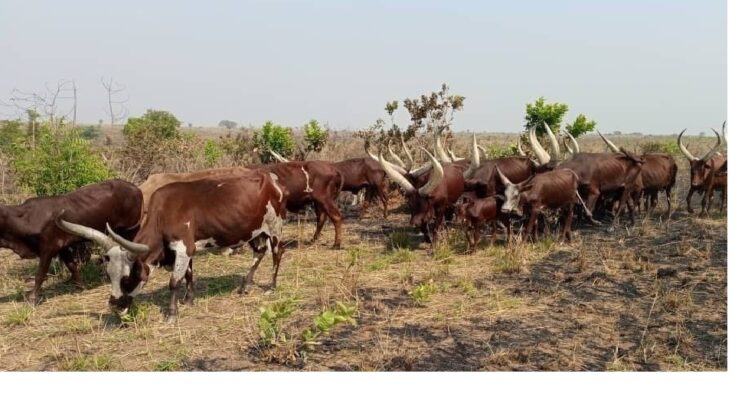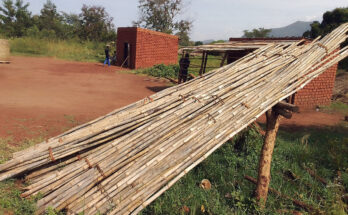PHOTO: Grazing cattle in Okidi Parish, Attiak sub-county, Amuru district. Photo by Willy Chowoo
A new phenomenon of land grabbing has emerged in Amuru district where land buyers connive with some family or clan members to sell community land. Many of the buyers then move quickly to get titles for their land just by the ink of a pen through fraudulent procedures. As a result of these dubious land transactions and titling, land conflicts and fear among communities in the district that they may lose their customary land is on the rise.
If you go to Amuru district these days, you hardly get the district leaders in their offices – this is not because they are absent from work, but because they are in the communities mediating land disputes resulting from these fraudulent land transactions in the district.
Land matters form 60% of the office work of the district chairman of Amuru District Local Government and this has made the work of the local government very difficult. “Instead of rendering tangible services to the community, we are taken up to mediate land matters”, Lakony Michael, the Amuru District Local Council Five (LCV) Chairman complains about land conflicts in the district.
It is even worse with the office of the District Security Committee chaired by the Residence District Commissioner where the biggest work is also mediating land conflicts. “It is almost 80% land related; we do 20% of other administrative work”, Odong Stephen Latek, RDC of Amuru district
The new phenomenon of land grabbing
The recent climax of land conflicts in the district has been a result of sales of community land which is occupied by some members of the community who returned from the Internationally Displaced Persons’ Camps (IDP camps) between 2007 and 2010 and settled on public land after the Juba Peace Accord of 2006 between the LRA rebels led by Joseph Kony and the government of Uganda. Public land in Acholi setting is land gazetted for communal activities such as hunting and honey harvesting, grazing and housing raw materials for construction which is communally owned and used.
These are the people who defied the return home message when people were requested to return to their original places where they were forced into the IDP camps in 1996. They are the ones who are now claiming ownership of the public land which is communally owned. The occupants claim that they got vacant land.
Okot Justo Gwanga, the Prime Minister of Ker Kwaro Attiak says, they tried to talk to people who recently settled on the public land in vain, “this, in turn, made individuals including some government officials put mark stones on our customary land”.
This new land-grabbing phenomenon is being orchestrated by investors doing business in the names of animal rearing from Central and Western Uganda. Those in the animal business are the Balaalo pastoralists. Amuru district has more than 20,000 herds of cattle owned by these herdsmen. They also include those investing in Sugarcane mainly in Attiak and Lakang sub-counties respectively, and the other category is those renting the land for commercial charcoal production which is scattered throughout entire the district.
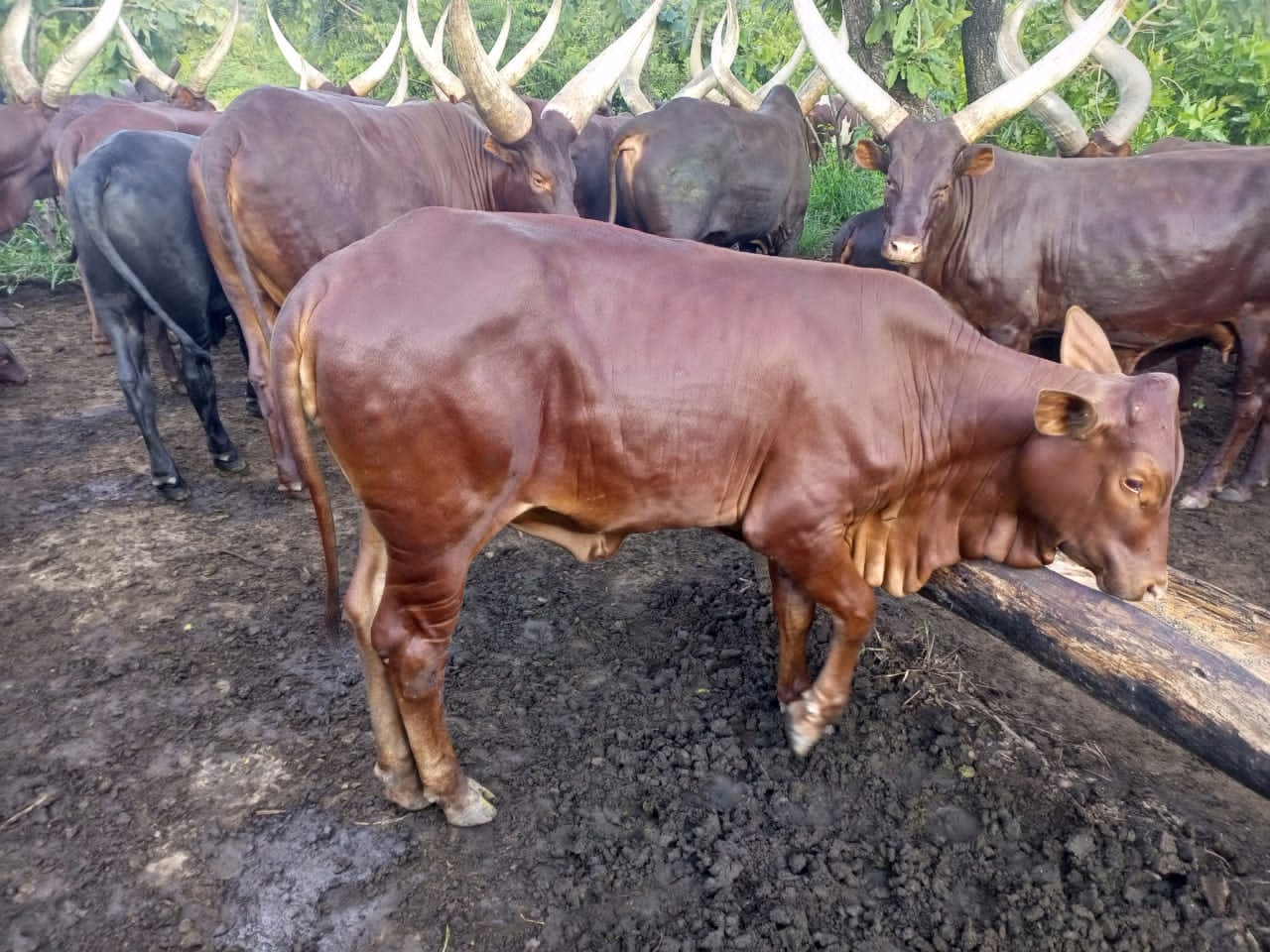
These investors, as it is said, connive with some of the family members to sell public land without the consent of other family members or clans. They manipulate the fragile land registration processes in Amuru district to get titles on people’s land with just an ink of a pen.
In this scenario, the big wigs gang up with the local leaders to create a ghost village, forge documents and stamps to authorize land sales for different individuals on the public land and these are the trigger of the continued land conflicts with 33% of the land matters in court already lost to the land grabbers according to the district leaders.
The land buyers are using the ignorance of the locals to cheat them, for example, they claim to be buying land into acres, but when it comes to measurement of the size of the land, it is done in hectares and this is common in all places in Amuru District. “They are taking people’s land twice what they bought and many people in Okidi parish are losing their customary land just like that”, Mr Okot narrates.
The new wave of land conflicts in Amuru excludes 10,000 hectares of land given to the Madhivani Group of Company at Lakang Sub County, where hundreds of landowners are still waiting for money to compensate them for their land offered for the Sugarcane investment.
The most affected sub-counties in the district are Pogo, Lakang and the Greater Attiak sub-county which comprises two sub-counties of Opara and Attiak respectively.
In the greater Attiak Sub County, it has an estimated land size of 290,472 acres but 78,574 acres have fraudulently been sold to investors over the last decade. This leaves the area with only 212,898 acres to the individual owners. This means 27.1% of the customary land in greater Attiak Sub County has been sold over the last 10 years.
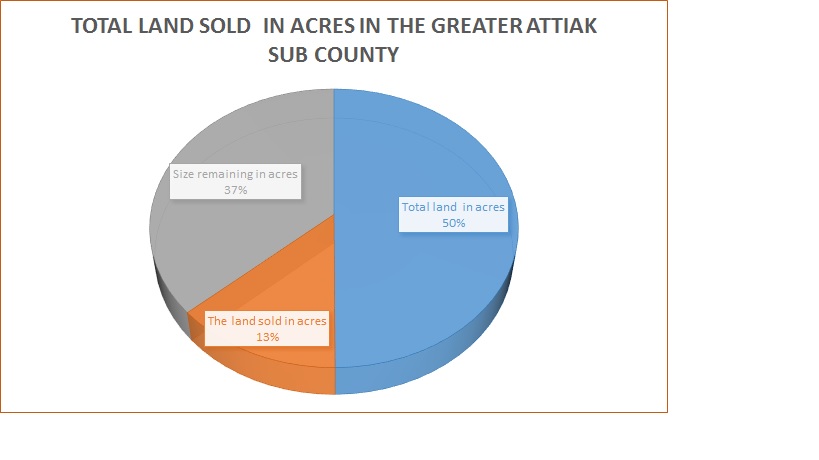 The original Attiak Sub County has 15,690 acres of customary sold in the villages of Pupwonya South, Elegu Town council, Kalaadima, Okidi North and South respectively and the worst affected parish Okidi in Attiak Sub County with 90.1% (14,130 acres) of this 15690 acres of land have been sold mainly to the pastoralists for cattle rearing and some for charcoal production in the two villages of Okidi North and South.
The original Attiak Sub County has 15,690 acres of customary sold in the villages of Pupwonya South, Elegu Town council, Kalaadima, Okidi North and South respectively and the worst affected parish Okidi in Attiak Sub County with 90.1% (14,130 acres) of this 15690 acres of land have been sold mainly to the pastoralists for cattle rearing and some for charcoal production in the two villages of Okidi North and South.
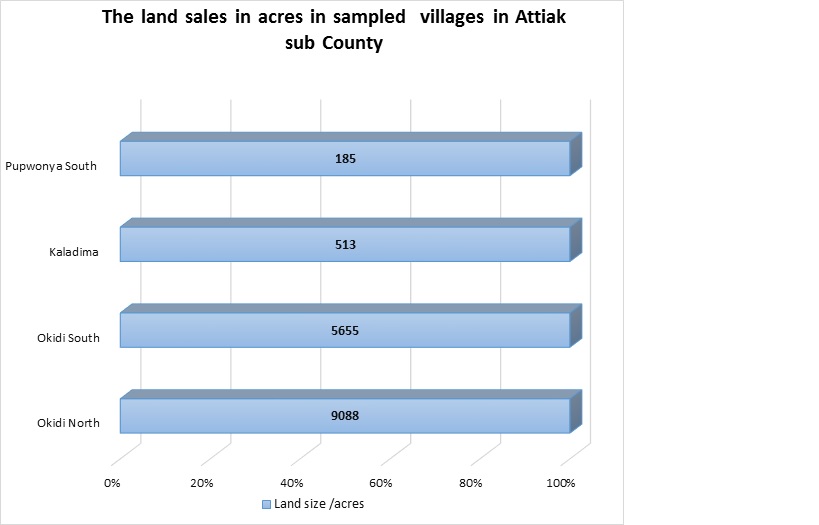
The amount of money collected in the dubious land sales for 15,690 acres is about 4bn shillings as per statistics generated by the sub-county authority.
In this new phenomenon, the land buyers also connive with the purported land owners and the local leaders to sell community land without the consent of other family members or the clans. Okidi parish is the most affected area with three-quarters of the land irregularly sold as per the report of the verification committee on Balaalo land ownership in the greater Attiak Sub County.
As of July 2022, 14130 acres of land were sold to the tune of shs3, 867,800,000 in Okidi Parish in the last 7 years. Okidi parish alone has 13000 herds of cattle belonging to the pastoralists.
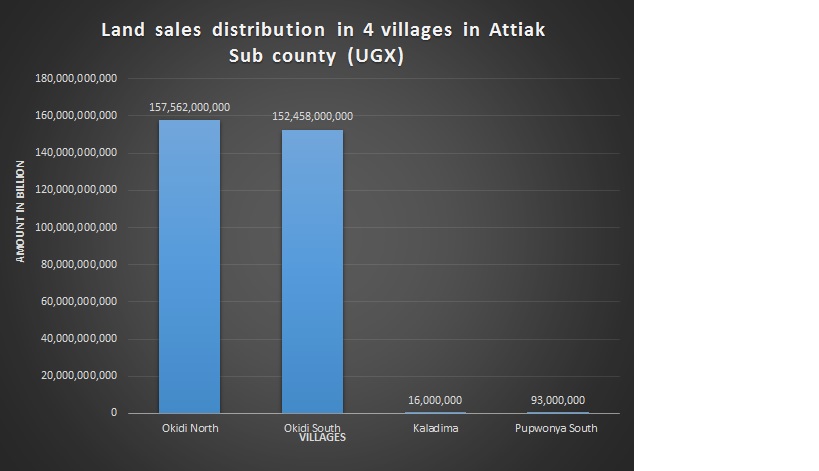
The graph above shows the verification in the amount of money paid for different sizes of land sold, and this means the land sellers give their land depending on their knowledge of the land market and it is the reason why most of the pieces of land are being sold cheaply.
Land victims speak out on the land grabbing
Lakwonyero Moses a resident of Okidi North village in Attiak sub-county whose customary land of 200 hectares was illegally sold and titles issued on it without the consent of the family members said: “We came to detect later that our ancestral land has titles put by the encroachers (Balaalo herdsmen) after one of our relatives connived with them and illegally sold 200 hectares at shs480m to the Balaalo Herdsmen”.
These irregular land sales have not affected the community land only, but also the cultural and historical sites such as hills or hunting places. For example, in Okidi South, the fraudsters have gone ahead to sell the most respected Cultural Hill for Attiak Chiefdom which was previously used for traditional rituals as well as communicating with God during times of trouble.
Two members of a family connived with two Balaalo herdsmen to sell Got Olima (Olima hill), the cultural site at 428 acres at a tune of sh133.5m. Got Olima is like other great mountains in Acholi land such as Guruguru, Lapul and other mountains where elders would always go whenever there is trouble such as sickness, droughts and others to pray and ask God for his intervention over such troubles.
Okot Justo Gwanga, the Prime Minister of Ker Kwaro Attiak (Attiak Chiefdom) says as cultural leaders, they tried to talk to people who settled on the land (Okidi) but people refused and this in turn made many people claim ownership in the community land in the areas including civil servants and government soldiers.
Okot adds that this has made unscrupulous people enter into Attiak, “Ker Kwaro tried to stop people from bringing Balaalo herdsmen into Attiak land but people turned against Ker Kwaro, and they ended up settling in the hunting and cultural sites of Attiak Clans”.
Okot says this has made many people claim huge chunks of land that an individual cannot own and some went as far as putting mark stones on public land, “We thought people were hiring land from communities, instead they were buying land fraudulently under the watch of the local leaders, and they were not selling their own land”.
The premier says these people own hundreds of herds of cattle and some of them are top army officers who illegally acquired the land from people who are claiming the customary land of Attiak Community. “They are getting land cheaply from the community who are aware that the land does not belong to them”.
Mr Okot notes that issues of customary land have become a very big challenge to the cultural institution because people don’t want to respect the institution. “We are threatened. People vow to kill us when we try to stop them”. The institution wanted some part of the community land gazetted for children born in captivity who don’t have land, but this plan is being affected by dubious land sales. As of now, “we don’t have any land to give them, some of them don’t know their parents or clans, the issues of land disputes involving them would not be a big problem”.
In the neighbouring village of Gem, in Attiak sub-county 8,886.4490 hectares (21958.8937 acres) of customary land have been illegally converted to freehold by some family members without the consent of other family members. These same family members went head leasing out 6,076.6 hectares (15015.60561 acres ) to Horyal Investments Holding Company limited for a period of 49 years for a sugarcane plantation. This has left the 8 clans of Pacilo without farm or grazing land.
Okee Peter Ogik, one of the family members, says the move to convert and lease their customary land has made them landless, and without rights to own the customary land that their grandfather left for them.
Okee says right now, “Our children cannot go to school because all our farmland has been taken up by the farm, we don’t have anywhere to dig, and they have pushed us to abject poverty being the only resource our father left for us”.
Although the constitution of Uganda legally recognises customary tenure, its ability to offer land tenure security for vulnerable groups such as widows, children, the elderly, and the physically disabled is still questionable as the case of Akello Susan-a 80-year-old widow who has been forced out from her married land with impunity in Opara Sub County.
Akello is among the people from the five different households who were forcefully evicted from their customary land in the villages of Lulaiyi, Palukere, and Pamoa. She has now taken refuge with her daughter 17 km away from her customary land.
“There is no way I can get what to feed on, my entire land has been fenced off, I don’t have the capacity to chase him away from land, I don’t want to die outside my home, I want to be buried here next to my husband ”, Akello narrates her story.
Lukwiya Peter, the chairperson of Local Council Three of Opara Sub County says in his sub-county, the locals connive with other investors to sell pieces of land without the consent of other family members or land that does not belong to them which has become very rampant in the area.
“You find some section of family members just sit, and they make their own agreement, they insert names of those who are absent, for them, and they go head with buying the land fraudulently”, Lukwiya adds.
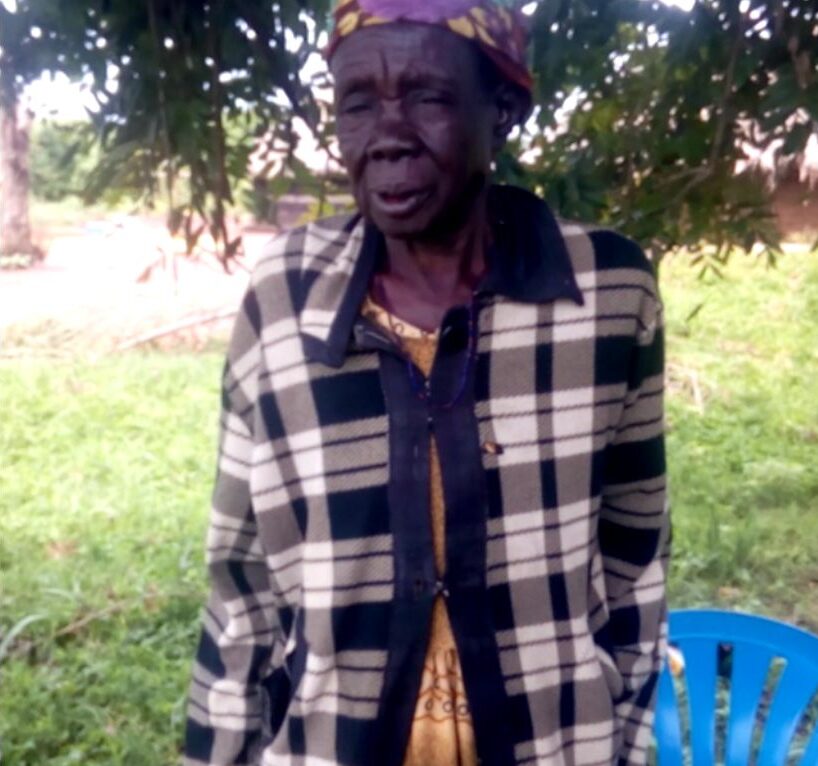
Akello Susan is a victim of such a fraudulent land transaction –where unknown people sold her land to a local investor without her consent and he has now chased her away from her ancestral land. The investors in the sub-county have acquired more than 2000 acres in such kind of transaction.
Gaps in the land registration process
This new development is attributed to the weak leadership in the lower councils in the sub-counties. They include the chairpersons of the local council one and two and the Area Land Committees. These are the leaders who are being used by the land grabbers to authorize illegal land sales. The common land fraudulent sale beneficiaries are the top army officers, medical doctors, and businessmen who own hundreds of herds of cattle.
It is alleged that the Area Land Committees always forge reports and just call people to sign land documents without reading the documents to them, and this is very common in Okidi Parish where 14,130 acres of land have been lost in fraudulent transactions. It was discovered that the official stamp of the chairperson of Attiak Town Council was wrongfully used in March 2021 to authorize land sale in an area within Attiak Sub County which is not within its jurisdiction and the town council became operational in July 2021.
Lakwonyero Moses a resident there says people are looking for the market of these lands as if they are looking for the market of clothes, and expresses fear that in the long run, the population shall become squatters in their own land.
Lakwonyero attributes this to the negligence of the Area Land Committee and District Land. “The Area Land committee just call people to sign documents without knowing it, due to their ignorance. When people see money, they just sign without any consideration”. He also faults the District Land Board for failure to do due diligence while documenting land in the area. “They don’t give the 14 days’ notice to the community”.
Akera Samuel, the chairperson of Attiak Sub County speaks of the Area Land Committee during inspections, “They don’t move to the ground, they just sit in the office and draw a sketch map and continue approving particular applications”. Akera adds that “the person would tell them that ‘I have this number of the acres of land’, and they just approve it without going to the ground to inspect the land”.
However, the Sub County authority during the time when this story was done had temporarily suspended the work of the Area Land committee and also stopped the survey of any land in the disputed areas as an investigation into the irregular land transactions is continuing, a move to reduce on the irregular sale of public land. The Area Land Committee is appointed by the Sub County leadership and approved by the District Leadership. It is an auxiliary of the District Land Board.
The Area Land Committees and the District Land Board are jointly on the spot in this illegal land documentation in the greater Attiak Sub County, the community say they are always not given notice about any land documentation as required by law-a two-week notice of survey for titling of land.
The District Land Board is appointed by the District Executive Committee and approved by the Ministry of Lands, Urban Planning and Development. They are mandated with duties of performing, holding and allocating land in the district that does not belong to any person or authority and also facilitate the registration and transfer of interests in the land.
Amuru district local government chairman Michael Lakony says that the land registration process in Amuru district has been interfered with by people who smuggled their way through the legal system to manipulate their colleagues within the villages.
“For the last five years, I battled with the District Land Board because they are people who messed up the land registration processes in Amuru district due to their egocentric tendency and their selfish interest”, Lakony adds.
The documentation for titling is always forwarded by the District Land Board to the Ministry of Lands, Urban Planning and Development.
Mr Philip Adonga, the principal Land officer in the Ministry of Land, Urban Planning and Development at Gulu Zonal land Offices says they are tasked with the responsibility of encouraging land registration. “We verify documentation that comes from the district; whether they are properly executed and that includes whether the rights in land therein defined and can be ascertained given the documentations therein”.
Adonga admits that there are times when the Area Land Committees don’t understand land documents and yet they are the people to help them identify the owners of the land. “Our Area Land Committees do not understand exactly what is required in a particular thing, where they, therefore, misrepresent. Those errors would run throughout the records which should have been identified and it is the first instance of documents”.
He says they sometimes, advise and send it back and then they would then change it, “but we are working on it to make sure that we build their capacity so that they do their work and they do it very well”.
Seeking legal redress
At the Ministry offices in Gulu City, there are many landowners who have applied for caveats, asking the ministry to block the transfer of titles illegally acquired on their land to any other person until the matters are resolved. Records at the Ministry also show that there are many people with title documents but they don’t know where their lands are located, these are people who got land in Okidi parish through illegal processes. This is what is described as titles on papers.
In quest, to get help, a number of landowners are running to the court of law seeking legal redresses so that they have their customary land reverted back to them.
Okee Peter Ogik is among those seeking justice at Gulu High Court, he says they opted for court because they want equal ownership in the land as it is inherited land left by their forefathers. “We want legal redress, we want us to be inclusive in the land registration, and we can’t be rendered landless by four people whose names appeared in the title”, Okee adds.
Lakwonyero Moses is another person who is also up at Gulu High Court to help recover their customary land, he says they want the high court to cancel all titles illegally issued on their customary land because the land is not for sale, “we are battling it in court so that the time the court rule, should come and rule in our favour”.
In Acholi sub-region, the common issues in the court are land-related matters, for example, at Gulu High Court as of September 2022, there were 772 cases of land matters from Acholi sub-region, of which 176 are main suits, 307 civil appeals and 289 applications seeking for interim injunctions on disputed land. 75% of the land matters in this court on customary land.
However, much as many people are seeking justice from the court, some of these cases have taken more than 10 years without judgement, for example, out of 176 land main suits, there are only 2 cases that have been heard, 15 cases of the civil appeals have been heard and only 5 cases of 289 interim applications have also been heard. This means only 2.9 % (22 cases) of 772 before High Court have been heard since the beginning of the year 2022.
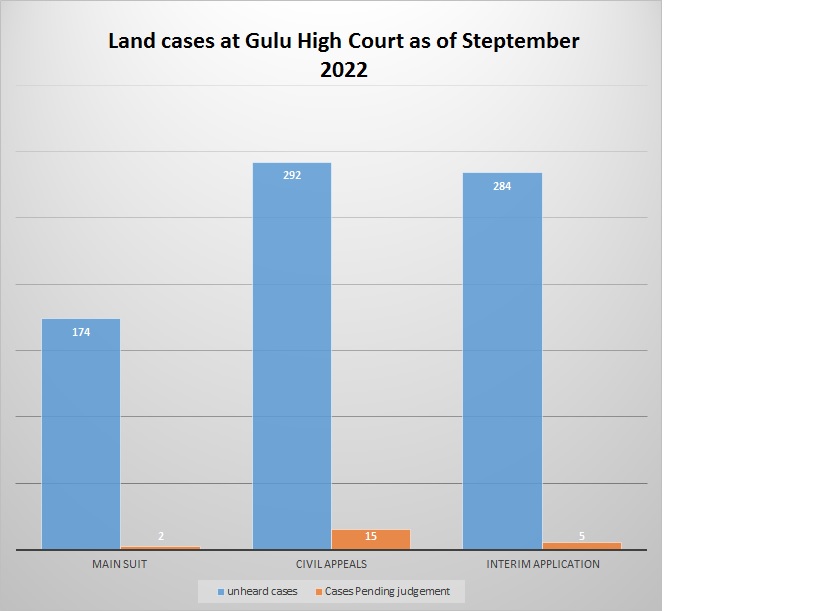
Gulu High Court deputy Registrar, Ntalo Nasulu Hussein attributes the delay to understaffing of the court and lack of funds for speedy hearing and judgement.
Uganda, requires sh46m to handle 40 cases in 40 days at the high court, this means that to dispose off the current 772 cases, the court needs sh887.8 million and this money might not be available for the expeditious hearing of these cases.
Ntalo adds that Gulu High Court in the near future will have two judges to help reduce the backlog, “we try mediation in many cases, but our population is very hard, but basically, the judiciary is doing their work, we are making strategy to see we how can reduce these backlog cases”.
Amuru district chairman Michael Lakony says much as people are running to High Court to help them cancel titles on their land, it is cheaper to use the district offices to forward their petition.
“These people should give us the grounds because through council it would be a shorter move for cancellation of the titles than the court”, Lakony adds.
Land mediations alternative to court.
The local leaders are using mediation as one of the ways to help reduce escalating land grabbing and conflicts. It has worked in some cases to resolve the conflict amicably.
Other than the offices of the district chairman LCV and RDC, the sub-county leaders also spend most of their office hours handling land matters. In Attiak Sub County where the illegal land sale is rampant, the sub-county chairperson Akera Samuel says he handles at least 20 cases of land conflict every month and on average over the last year, he has mediated over 200 land cases and more than half was resolved amicably
The Deputy High Court Registrar, Natalo Nasulu says using Alternative Disputes Resolution Mechanism which should be headed by the clan heads is the best way to resolve the escalating land conflicts in Acholi land is to use
“Most of the cases we handle in High Court are land matters, most of these land cases here are customary, these matters are so enormous everywhere, and the clan leaders need to come and address this issue”, Ntalo adds.
Ntalo says people in Acholi land are very hard and they do not want to believe in a win situation which has made mediation to become very hard, but he says the clean leaders should do more in resolving land disputes to reduce the escalating land conflicts in Acholiland after the war. “The clans have not come in to help the population because people were displaced during the war, and people who are supposed to resettle them, they are involved in the land grabbing”, he adds.
Amuru Residence District Commissioner, Odong Stephen Latek says the community needs to register their land in the name of a trust so that it has the legal status in the interest of a particular community. “The community and their leaders need to be empowered to be able to claim and regulate such land in the name of the community so that it will be them to claim, it will be them to legitimize it, take a decision on the usage of the land”.
Land plays a vital role in the cultural, socio-political, and economic organisation of the Acholi community, but this has become the epicentre of tensions and conflicts, a phenomenon which never existed before the war.

